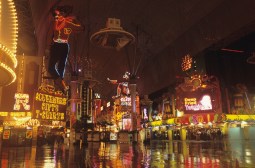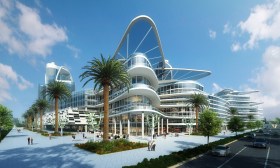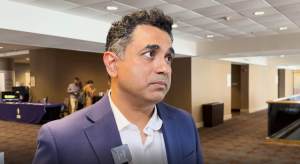Las Vegas innovation district garners support from Cisco, IoT startups

Las Vegas is doubling down on its smart city efforts through a series of new partnerships with Internet of Things (IoT) startups and Cisco.
Ever since the city launched its “innovation district” in February of 2016, smart city companies have gravitated toward it to test their sensor networks, IoT platforms and other emerging technologies. As a staple in this push, on June 27, Las Vegas Mayor Carolyn Goodman announced the city’s partnership with Cisco to utilize the company’s analytics tools to collect data about traffic movement, water use, pedestrian activity, waste, lighting and other environmental factors.
The announcement, made at the annual Cisco Live Las Vegas conference, was followed by yet another announcement from the Internet of Things startups Numina and Motionloft on June 28. The two intend to use their sensing hardware and data platform to track cyclists, pedestrians and automobiles in real time for city planners. Goodman recognized the district as a potential catalyst to spread the solutions across the city, simultaneously raising living standards and augmenting services.
“Las Vegas is becoming known for its efforts to provide safe, reliable and efficient civic technology,” Goodman said in a press release. “We plan to deploy solutions that will enhance mobility, reduce congestion, improve resident safety, reduce our carbon footprint and stimulate economic growth and diversity.”
Las Vegas Chief Information Officer Michael Sherwood told StateScoop the partnerships are the latest among many that the city is trying to cultivate through its innovation district, an area dubbed a “digital playground” by officials, that covers the famous Las Vegas Strip, with its casinos, hotels and restaurants, along with much of the downtown.
“The city of Las Vegas is very aggressive in its smart city efforts,” Sherwood said. “We are very interested in becoming a location for technology, not just for entertainment and gaming, but technology in general.”
With massive events of all types, more than 650,000 citizens and 42 million visitors last year, the city initially envisioned its innovation district as a way to showcase smart city technologies while enticing visitors from the tech industry to contribute and test their latest wares. In a way, it was a kind of self-feeding mechanism — the more technology people contributed, the more others wished to share their latest wares, and the benefit amounted to a smart city sandbox achieved at limited risk to the city. The city’s annual Consumer Electronics Show (CES) is one of the world’s largest technology conventions, and its host city is leveraged the event in 2016 to drive further participation in the new district.
Tara Pham, CEO and co-founder of Numina, said the district also represents an openness to new ideas and a willingness to develop them.
“It’s great to see the city eager to invest in and test the next generation of civic technology.” Pham said in a press release. “There are a number of conditions, projects, and events downtown that present exciting opportunities for us to test Numina’s capabilities. Plus, we appreciate the city’s feedback along the way, to ensure that we’re providing the intended value to the community.”
The new agreement with Cisco allows the city a try-before-they-buy experience as they test drive Cisco’s Smart+Connected Digital Platform. This platform will enable the city to analyze IoT data from a mix of devices and sensors in real time. The heightened situational awareness is hoped to assist with issues like crowd control, traffic management and emergency response, and to reduce maintenance and operating costs. Providing possible use cases, Sherwood said air sensors at local schools that detect high levels of pollutants may alert officials to regulate how and when industrial facilities release emissions, while smart cameras detecting jaywalkers might prompt new sidewalk barriers for safety.
For those worried about surveillance, Sherwood said that the new smart city technologies would not be used as tracking tools or for remote patrolling by law enforcement. None of the systems being tested are designed to monitor data specific to an individual, whether that be a motorized vehicle, bicycle or pedestrian, he said.
“We’re not analyzing the data on an individual basis — we’re analyzing the data on a collective basis,” Sherwood said. “One of our mottos in Las Vegas is ‘Building community to make life better,’ and so for us, a smart city really is about how we treat consumers — residents or tourists and how we make sure the environment they’re in is appealing.”






